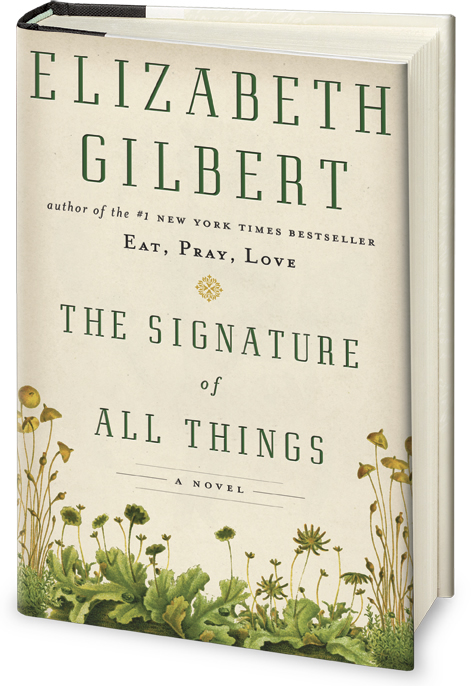I will do my best not to reveal spoilers for those who have yet to read these books, but I still want to honor them with truly thinking about and discussing what they present.
Over a year ago, a good friend got me Elizabeth Gilbert's Signature of All Things for a Christmas present and I began reading it. But for some reason - life? - I put it down and didn't pick it up again until this winter. It has one of the most amazing scenes I've ever read: a simply magical evening from the perspective of a little girl. It's near the beginning of the book, when Alma's father hosts an Italian astronomer and the party, to avoid overheating, spills out onto the lawn where he orchestrates the guests into orbit as the planets. Best of all, Alma is given a torch and set running through their midst as a comet.
I loved how intelligent Alma is - a woman in the sciences, ahead of her time. (Of course, she had money and greenhouses of her own.) I loved her attitude about heartache, set backs, and frustration: put your head down, do the work, grind despair under your heel. Eventually it will give way. (It is true Gilbert advice, like from Eat, Pray, Love "...you should never give yourself a chance to fall apart because, when you do, it becomes a tendency and it happens over and over again. You must practice staying strong, instead.") I also admired how, when it is so possible to fall into ruts, Alma completely re-invents herself, taking huge risks, making significant sacrifices to personal comfort, in the middle of her life... right when complacency can set in. This mid-life is so easily a time when we can throw up our hands, divest from changing the world and dogma, and settle into some personal sense of comfort. Not Alma, she packs up and heads for the tropics.
What I didn't like, one little bit, was the climax of the book. I will not discuss it.
Unexpectedly, the book I got this year in the Kaufmann Christmas Book Exchange took me right back into female-scientists-researching-obscure-things-in-the-tropics. I'd just wanted to read some more of Ann Patchett's work since she's coming to Burnsville in the fall for the Carolina Mountains Literary Festival (along with Barbara Kingsolver). Just thinking about it makes me hyperventilate a little.
Anyway, to the book, State of Wonder. The climax and ending of this novel, by comparison were unexpected and so much more satisfying. In particular, the ending was not neatly sewn up, but open to wild possibilities of love and heartache unlike anything the book even touched upon--or exactly like the book had touched upon. Again, though, women scientists--two this time. One at the end of her career, and one in the middle of it. The characters are like Alma in some ways -- they put their backs into the hard work, embrace adventure, risk and wonder. They sacrifice for love and relationships. They too, are childless in the novel.
Which brings me to the fact that both Gilbert and Patchett are childless and brilliant novelists... a fact that bothers me because I don't want to believe the two factors are as closely related as I suspect they are. It does no good to dwell there too long.
Then, because Parkway Playhouse is doing Tom Stoppard's Arcadia this summer, I picked it up for perusal. Lo and behold, I was back in the company of a brilliant young woman mathematician-scientist and women novelists. Back to the meticulous proving of theories and lives spent utterly devoted to them. In Arcadia, I return to the West Indies for botany expeditions. I was back in heartbreak, of people being attracted to... well, who they're attracted to, with no regard for the sense it makes. This play says more directly what the other novels echo: it is "sex that throws off nature's ordered plan."
It is uncanny, the three of them in succession. It is like the characters in Arcadia echoing each other through time: nothing is ever truly lost, it is discovered again and ideas overlap themselves. Time plods on slowly, like the turtle (named Lightning), while we cartwheel around in these capricious lives spent pursing such fleeting things like love and happiness. Even the strictest pursuit of scientific knowledge does not make one immune. For Alma, it was the capacity for self-sacrifice that punched holes in her theory. For Thomasina and Marina, I believe it was attraction--and what to do about it.
As for me? I didn't go into the sciences.



2 comments:
Loved State of Wonder, haven't read Elizabeth Gilbert's (I stopped after Eat, Pray, Love...). Both of them also make me think of Barbara Kingsolver's Prodigal Summer.
I majored in Sciences, I work in them too. Oh, and I have children... Now back to work on my novel (seriously.)
I won't think about brilliant novelists WITHOUT children if you don't.
Gilbert's fiction is unlike her non-fiction, you really must give it a try. It is a testament to meticulous research!
We'll take our cues from Kingsolver: marriage, kids, farm and novels.
Post a Comment